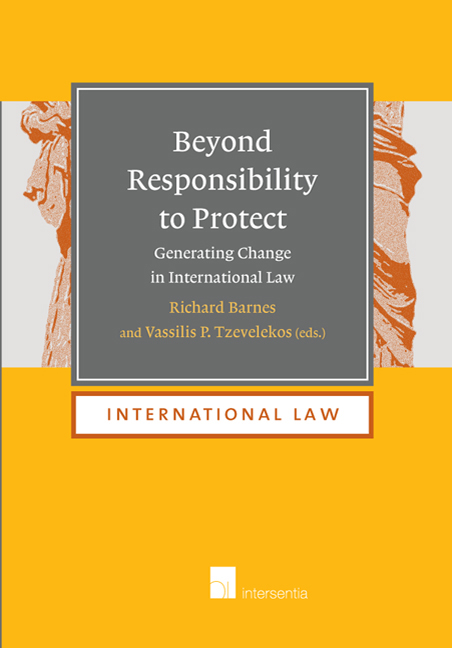Book contents
- Frontmatter
- Dedication
- Foreword
- Acknowledgements
- Contents
- Table of Cases
- List of Authors
- Introduction
- Part I The Moral Underpinnings and Political Ends of R2p
- The Kantian Defence of Murder
- A ‘Responsibility to Democratise’? The ‘Responsibility to Protect’ in Light of Regime Change and the ‘Pro-Democratic’ Intervention Discourse
- Commentary: Between Kant and Al-Shabaab
- Part II International Institutions And Their Role In R2p
- PART III De Facto Regimes and Non-State Actors Within a State And as a State
- Part IV R2p and Due Dilligence Regarding the Conduct of Corporations
- Part V The Interaction Between R2p And Humanitarian Law Obligations To Protect Civilian Populations
- PART VI R2p and International Criminal Law Beyond the Four R2p Crimes
- Part VII R2p and its Possible Impact on the Law of International Responsibility
- Part VIII Concluding Observations
- Index
The Kantian Defence of Murder
from Part I - The Moral Underpinnings and Political Ends of R2p
Published online by Cambridge University Press: 19 September 2018
- Frontmatter
- Dedication
- Foreword
- Acknowledgements
- Contents
- Table of Cases
- List of Authors
- Introduction
- Part I The Moral Underpinnings and Political Ends of R2p
- The Kantian Defence of Murder
- A ‘Responsibility to Democratise’? The ‘Responsibility to Protect’ in Light of Regime Change and the ‘Pro-Democratic’ Intervention Discourse
- Commentary: Between Kant and Al-Shabaab
- Part II International Institutions And Their Role In R2p
- PART III De Facto Regimes and Non-State Actors Within a State And as a State
- Part IV R2p and Due Dilligence Regarding the Conduct of Corporations
- Part V The Interaction Between R2p And Humanitarian Law Obligations To Protect Civilian Populations
- PART VI R2p and International Criminal Law Beyond the Four R2p Crimes
- Part VII R2p and its Possible Impact on the Law of International Responsibility
- Part VIII Concluding Observations
- Index
Summary
INTRODUCTION
The Responsibility to Protect (R2P) did not appear in this world fully formed in the International Commission's report on Intervention and State Sovereignty. Rather, that report was ‘an attempt to integrate pre-existing but dispersed practices of protection into a coherent account of international authority’. It is an idea with a long history. Anne Orford's historical account of the development of the idea of protection draws attention to how it interacts with sovereignty and self-determination, particularly in decolonising states. Orford ‘s account of R2P asks an old question of this new discourse – who decides? Who decides what protection is, or who can offer protection. The language of responsibility and protection provides potential concrete grounds for judging who is an effective sovereign, but it also moves away from the traditional values of sovereignty as originating in the people, and moves to an external judgement by the international community. I want to look at one particular form of justification for intervention within a state, which Orford also addressed more recently: the idea of a moral duty derived from Kant. However, whereas Orford primarily addresses Kenneth Walzer as representative of this form of argument, I will critically engage with two writers who more directly draw on Kant for their ‘moral internationalism’: Jürgen Habermas and Fernando Tesón. Both these leading proponents of a moral basis for intervention use Kant to support their argument. I call this the Kantian defence of murder.
These arguments in support of intervention are based primarily on Kant's essay ‘Perpetual Peace : A Philosophical Sketch’. In this famous work Kant sets out what would be required to guarantee a state of perpetual peace. Lawyers have failed to achieve peace, their work amounting merely to ‘sorry comfort’ in the face of politics. What is needed is a set of specific changes in the structure of global politics. Kant's essay is fundamentally about how to secure a universal, normative, metaphysical moral ity which applies to all rational beings, as described in ‘Groundwork to the Metaphysics of Morals’. As such it describes the final point of human development, anticipated in Kant's teleological works.
- Type
- Chapter
- Information
- Beyond Responsibility to ProtectGenerating Change in International Law, pp. 33 - 52Publisher: IntersentiaPrint publication year: 2016



